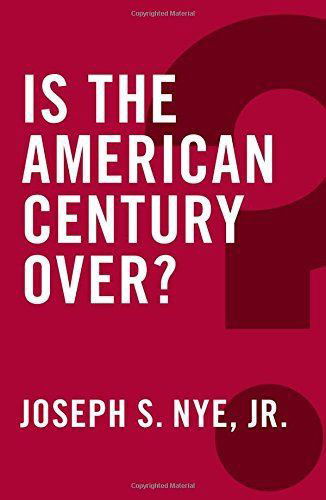A book written by Joseph Nye, a Harvard University professor, titled Is the AmericanCentury Over, has garnered widespread attention in the circle of international strategyscholars. As Nye is promoting his book, he has advocated the continuation of US globalinfluence. He emphasized that the Chinese economy will probably surpass that of the US,and the world will continue to become increasingly complicated, but the US will maintainits lead in military and political power. The "American century" is set to continue for atleast several more decades.
Some of Nye's arguments are clear and convincing, but his firm belief over the "Americancentury" and his specific discussion are contradictory. Actually, the concept of the"American century" was hardly true in the many years after the mid-20th century. Forinstance, by then, the USSR had launched the world's first man-made satellite, while at thesame time a bitter geopolitical rivalry gripped the US and the USSR. Thus, the "Americancentury" was convincing as a summary at the turn of the century, yet the idea hardlyapplies to the constantly changing new world.
Arguing over an "American century" or a "Chinese century" reflects a zero-sum mentality.From China's perspective, the 21st century definitely cannot be defined as a Chinese one.However, as the Chinese economy snaps at the heels of the US, while Washington can nolonger influence its allies over whether to join the Beijing-led Asian InfrastructureInvestment Bank, the claim that this century still belongs to the US does not hold water.
The old ideas of the 20th century can no longer describe the new era. Historical experiencehas provided us with patterns of thought, but it will be dangerous if we fail to see theissues today from a new light. International strategy scholars should break the shackles oftheir old ideas and be brave enough to create novel concepts.
The US will remain the nation with the strongest comprehensive national strength in theworld for quite some time, but it won't influence the world as it used to.
China and the US will continue to demonstrate their own merits in the 21st century, butother nations may not fill the role of satellite states as they did during the US-USSR ColdWar rivalry.
Although China follows a unique political path, the concept of harmony advocated byChina will have an increasing influence globally along with China's rise. Given itscomplicated geopolitical environment, China can only be ushered into the center of theworld by adhering to the principles of harmony.
Sticking to the terms of an "American century" or a "China century" will overly simplify acomplicated world. If the concept dominates the world, it will be a tragedy forinternational politics. We are already in the initial stage of all-win cooperation amongnations. The old concepts may force us back on the wrong path.


No comments:
Post a Comment